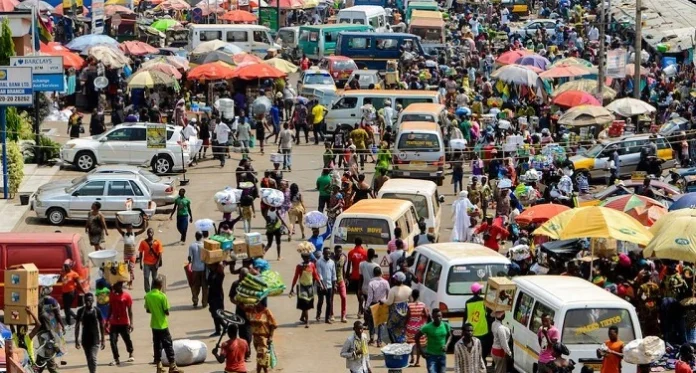Ghana faces a brutal economic reality check as the World Bank warns the nation could remain trapped in low-growth purgatory until after 2050 without immediate structural reforms, despite recent encouraging signs of recovery.
The international lender’s latest assessment, “Transforming Ghana in a Generation,” launched yesterday in Accra, paints a sobering picture of stagnant 3.8% annual growth that would delay the country’s transition to upper-middle-income status by decades while condemning millions to persistent poverty.
The warning comes as Ghana shows unexpected economic resilience, with growth reaching 5.7% in 2024 and maintaining 5.3% in the first quarter of 2025, significantly outperforming earlier projections. However, the World Bank argues these gains remain fragile without fundamental policy overhauls.
Ghana’s chronic economic instability has become a defining characteristic, with the country entering 17 International Monetary Fund (IMF) programs since independence, spending nearly 40 of the past 68 years under Fund support. This pattern represents what the Bank describes as repeated boom-and-bust cycles that have prevented sustained development.
The assessment identifies critical structural weaknesses including weak fiscal discipline, inefficient public spending, overdependence on natural resources, and delayed reforms that have kept productivity chronically low. These factors contributed to the 2022 macroeconomic crisis that forced Ghana back to the IMF for emergency support.
Current economic indicators reveal the scale of the challenge. Despite per capita income of approximately $2,200, average earnings have stagnated for over a decade, while nearly 500,000 young people enter the labor market annually with most opportunities concentrated in the informal sector.
The Bank’s alternative scenario offers hope, projecting Ghana could sustain 6.5% annual growth and triple per capita income to $6,600 by 2050 through strategic investments in education, skills development, and comprehensive economic reforms. This transformation would require unprecedented political will and citizen buy-in.
Recent fiscal improvements provide some optimism, with the government targeting a 3.1% fiscal deficit for 2025 and a primary surplus of 1.5%, contingent on reversing 2024 fiscal slippages. Inflation has declined from 23% in 2024 to 18.4% by mid-2025, supported by tight monetary policy.
The World Bank emphasizes that socioeconomic disparities and regional inequalities have widened while human capital gains have reversed, creating additional barriers to sustainable development. Energy and cocoa sector vulnerabilities remain unaddressed, leaving the economy exposed to external shocks.
Political economy factors could prove decisive. The Bank notes that success ultimately depends on the government’s ability to restore citizen trust and build a more durable social contract, suggesting that technical reforms alone cannot guarantee transformation.
Ghana’s development trajectory increasingly resembles other middle-income trap cases across Africa, where initial growth momentum dissipates without institutional strengthening. The World Bank’s assessment serves as both warning and roadmap, highlighting that the next few years will determine whether Ghana joins the ranks of successful emerging economies or remains stuck in developmental mediocrity.
The report’s timing coincides with growing international attention on African economic transformation, as global investors seek stable, high-growth markets beyond traditional emerging economy destinations.
Source: newsghana.com.gh











